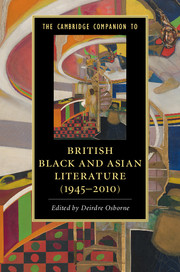Book contents
- Frontmatter
- Dedication
- Contents
- Contributors
- Acknowledgements
- Timeline
- Introduction
- PART I TRACES AND ROUTES
- PART II TRANSLOCATIONS AND TRANSFORMATIONS
- PART III RESTORATIONS AND RENOVATIONS
- PART IV NATIONAL, INTERNATIONAL, TRANSGLOBAL
- 12 ‘Adoption Aesthetics’
- 13 Genre Crossings: Rewriting ‘the Lyric’ in Innovative Black British Poetry
- 14 ‘Other’ Voices and the British Literary Canon
- 15 Critical Outlooks
- Further Reading
- Index
- Series list
14 - ‘Other’ Voices and the British Literary Canon
from PART IV - NATIONAL, INTERNATIONAL, TRANSGLOBAL
Published online by Cambridge University Press: 05 September 2016
- Frontmatter
- Dedication
- Contents
- Contributors
- Acknowledgements
- Timeline
- Introduction
- PART I TRACES AND ROUTES
- PART II TRANSLOCATIONS AND TRANSFORMATIONS
- PART III RESTORATIONS AND RENOVATIONS
- PART IV NATIONAL, INTERNATIONAL, TRANSGLOBAL
- 12 ‘Adoption Aesthetics’
- 13 Genre Crossings: Rewriting ‘the Lyric’ in Innovative Black British Poetry
- 14 ‘Other’ Voices and the British Literary Canon
- 15 Critical Outlooks
- Further Reading
- Index
- Series list
Summary
Book fairs, like anthologies, have always played a significant role in literary canonisation, which, Roy Sommer reminds us, is a ‘matter of inclusion as well as exclusion’. Illustrations of this statement abound in relation to Black British writing. From 1982 to 1995 the International Book Fair of Radical Black and Third World Books – initiated through a collective led by John La Rose – contributed to positioning emerging black authors as part of the British literary scene, while also showcasing the international character and the radicalism usually associated with the Black literary tradition. Today, however, in the context of book fairs, Black writing from Britain seems to have become relatively less noticeable. The 2014 Brussels Book Fair, whose ‘guest of honour’ was the UK, might be taken as a measure of this development. It is indeed striking that of the twenty-three ‘top’ British authors present (the most famous being Jonathan Coe), none had roots in Africa, Asia or the Caribbean, with the exception of two white writers born respectively in Zambia and Tunisia, A. C. Grayling and Patrick McGuinness. When one considers that the event had been put together by the British Council, the British Embassy and the bookseller Waterstones, and that the theme was ‘History, in all its aspects…notably, the Centenary Commemoration of the First World War’, this all-white line up does not bode well for the way Britain sees her past and, more worryingly, how she represents herself culturally in the heart of Europe. Even though books by Zadie Smith and Monica Ali were for sale in the Fair's Waterstones bookshop, the Britain showcased that week was, to say the least, misleading in ignoring the considerable contributions made by black and Asian writers to British literary history and heritage.
Although an anecdotal observation of one European book fair only, it is symptomatic of what is perceived informally as a decreasing visibility of British Black and Asian writing in non-academic contexts, in media coverage, in Britain's cultural institutions and in places of cultural dissemination. Whereas from the 1990s and into the 2000s, the British Council actively promoted contemporary literature by non-white British writers, nationally and internationally, this organisation is now less prominent on the literary stage, and when it is, as at the Brussels book fair, it seems to be less attentive than in the past to Britain's cultural diversity.
- Type
- Chapter
- Information
- Publisher: Cambridge University PressPrint publication year: 2016
- 2
- Cited by



